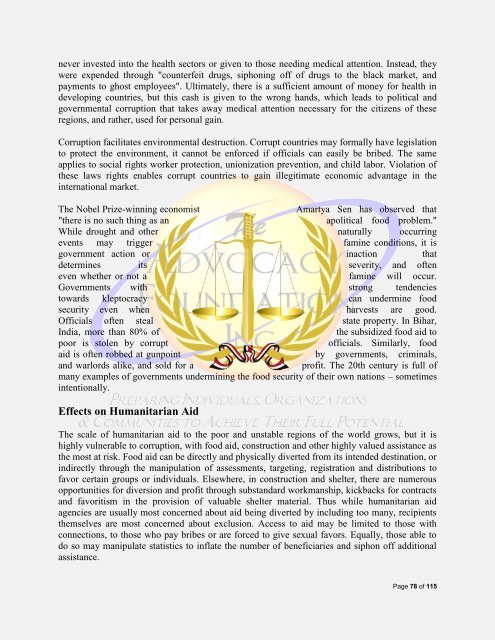Judicial ReEngineering
Judicial ReEngineering
Judicial ReEngineering
Create successful ePaper yourself
Turn your PDF publications into a flip-book with our unique Google optimized e-Paper software.
never invested into the health sectors or given to those needing medical attention. Instead, they<br />
were expended through "counterfeit drugs, siphoning off of drugs to the black market, and<br />
payments to ghost employees". Ultimately, there is a sufficient amount of money for health in<br />
developing countries, but this cash is given to the wrong hands, which leads to political and<br />
governmental corruption that takes away medical attention necessary for the citizens of these<br />
regions, and rather, used for personal gain.<br />
Corruption facilitates environmental destruction. Corrupt countries may formally have legislation<br />
to protect the environment, it cannot be enforced if officials can easily be bribed. The same<br />
applies to social rights worker protection, unionization prevention, and child labor. Violation of<br />
these laws rights enables corrupt countries to gain illegitimate economic advantage in the<br />
international market.<br />
The Nobel Prize-winning economist<br />
Amartya Sen has observed that<br />
"there is no such thing as an<br />
apolitical food problem."<br />
While drought and other naturally occurring<br />
events may trigger famine conditions, it is<br />
government action or inaction that<br />
determines its severity, and often<br />
even whether or not a famine will occur.<br />
Governments with strong tendencies<br />
towards kleptocracy can undermine food<br />
security even when harvests are good.<br />
Officials often steal state property. In Bihar,<br />
India, more than 80% of<br />
the subsidized food aid to<br />
poor is stolen by corrupt<br />
officials. Similarly, food<br />
aid is often robbed at gunpoint by governments, criminals,<br />
and warlords alike, and sold for a<br />
profit. The 20th century is full of<br />
many examples of governments undermining the food security of their own nations – sometimes<br />
intentionally.<br />
Effects on Humanitarian Aid<br />
The scale of humanitarian aid to the poor and unstable regions of the world grows, but it is<br />
highly vulnerable to corruption, with food aid, construction and other highly valued assistance as<br />
the most at risk. Food aid can be directly and physically diverted from its intended destination, or<br />
indirectly through the manipulation of assessments, targeting, registration and distributions to<br />
favor certain groups or individuals. Elsewhere, in construction and shelter, there are numerous<br />
opportunities for diversion and profit through substandard workmanship, kickbacks for contracts<br />
and favoritism in the provision of valuable shelter material. Thus while humanitarian aid<br />
agencies are usually most concerned about aid being diverted by including too many, recipients<br />
themselves are most concerned about exclusion. Access to aid may be limited to those with<br />
connections, to those who pay bribes or are forced to give sexual favors. Equally, those able to<br />
do so may manipulate statistics to inflate the number of beneficiaries and siphon off additional<br />
assistance.<br />
Page 78 of 115

















